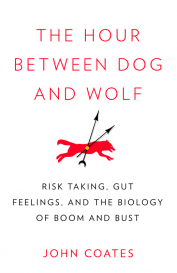REVIEW: The Hour Between Dog and Wolf: Risk-Taking, Gut Feelings and the Biology of Boom and Bust
Book by John Coates
Share
 Just in case anyone still believes bankers are rational, Coates, a derivatives trader-turned-neuroscientist, gives a guide to the biology of stock bubbles and busts. He purports to inhabit the body of traders in a omniscient recounting of financial decision-making. It seems that “irrational exuberance” has a molecular source, and its name is testosterone.
Just in case anyone still believes bankers are rational, Coates, a derivatives trader-turned-neuroscientist, gives a guide to the biology of stock bubbles and busts. He purports to inhabit the body of traders in a omniscient recounting of financial decision-making. It seems that “irrational exuberance” has a molecular source, and its name is testosterone.
For years, as the housing bubble inflated, (mostly) young men made winning trades. Their bosses rewarded them with money and their bodies rewarded them with testosterone. Higher-than-average profits led to more testosterone production, which led to ever greater, eventually delusional, risk-taking. We were left with “traders, most of whom are young males, with impaired judgment, doing dangerously silly things.” In a boom, appetite for risk and sex soars. After a bust, market pessimism is exaggerated by excesses of the hormone cortisol, making traders excessively risk averse. Impotence strikes, tempers flare, sleep suffers. The traders enter into a collective funk, and make yet more bad decisions.
In light of these biological vulnerabilities, Coates primarily advises a change in the biology of the market: namely, more women and older men. As men age they are less prone to testosterone surges, and women are immune in the first place. Yet women make up only five per cent of the trading floor. Of course, testosterone does not create a bull market in the first place, but it may inflate a bubble.
For all his references to the latest scientific research, experiments on traders are relatively few. A fuller account, no doubt, will follow Coates’s preliminary results. Still, the vignettes of traders making and losing vast amounts of money under the thrall of hormonal drives are intelligible and sadly plausible, if overly intent on using biological processes to create faux drama. The financial crisis, it appears, was not simply a result of wanton greed, but also of a kind of predictable madness.